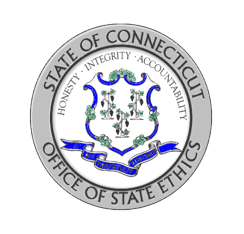Advisory Opinion No. 1993-22
Application Of Revolving Door
Law To Vice President And
Managing Director Of
Roger R. Phillips, Vice President and Managing Director of the Connecticut Development Authority (“CDA”), has asked how the Code of Ethics for Public Officials, Conn. Gen. Stat. §1-79 et seq., applies to him if he accepts a position with a corporation which received a $1.5 million loan from CDA in 1992.
Specifically, Mr. Phillips was the loan officer assigned by
CDA to analyze and present Structured Technology Corporation’s (“STC”) loan
request to CDA’s Board of Directors for formal review
and approval. The loan closed on
As a threshold matter, Conn. Gen. Stat. §1-84b(d) prohibits
a public official or state employee who participated substantially in the
negotiation or award of a state contract obliging the state to pay at least
fifty thousand dollars from accepting employment with a party to the contract
other than the state for a year after resignation from state service, if the
contract is signed less than a year before the resignation. This provision applies to loans granted by
the state and memorialized by contract. See
also State Ethics Commission Advisory Opinion No.
90-27, 52
Nonetheless, the remaining provisions of the revolving door
law will apply to Mr. Phillips. For one
year after leaving state service, he may not represent STC before the CDA on
any matter. Conn. Gen. Stat. §1-84b(b). The forbidden representation includes
attending meetings with CDA staff or officials, making telephone calls, signing
correspondence or other documents submitted to CDA, or including his name on
any letterhead so submitted. See
Advisory Opinion No. 91-24, 53
Mr. Phillips may never represent STC in connection with any
particular matter in which he participated personally and substantially while
he was in state service and in which the state has a substantial interest. Conn. Gen. Stat. §1-84b(a). For example, if a provision of the loan he
helped negotiate became the subject of a dispute between the CDA and his new
employer, Mr. Phillips must refrain from assuming any role for STC with regard
to that dispute. Similarly, Mr. Phillips
may not participate in any renegotiation of an existing provision of the
loan. “To hold otherwise would undermine
public confidence that the official had only the state’s interest in mind when
a particular contract was made.” See
Advisory Opinion No. 89-11, 50
Finally, Mr. Phillips may never use confidential information gained in his state service for anyone’s financial benefit. Conn. Gen. Stat. §1-84a.
Provided that these restrictions are followed, Mr. Phillips may accept the contemplated employment with STC.
By order of the Commission,
Christopher T. Donohue
Chairperson

